Is it Safe for Dogs to Snack on Persimmons? Let’s Find Out!

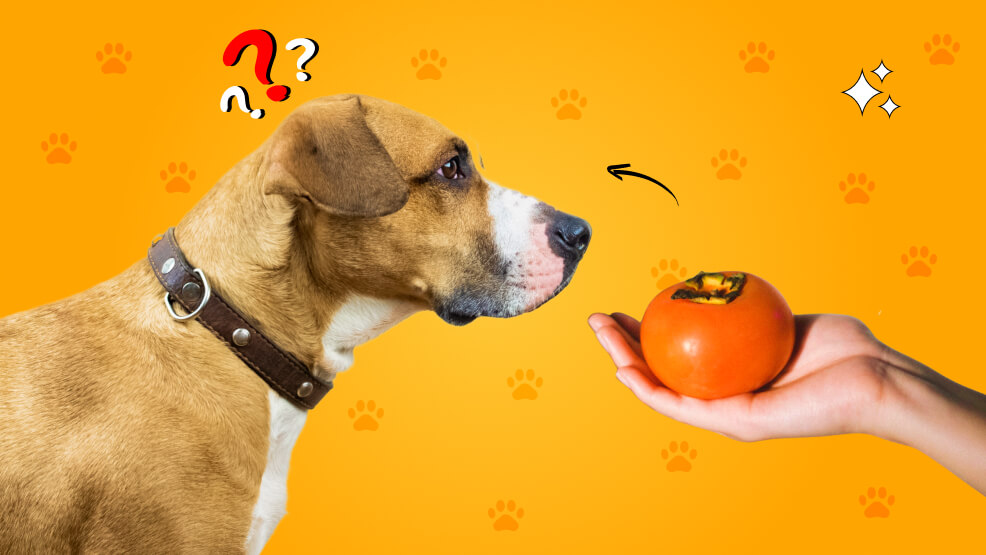
It is persimmon season right now, and more than once, you have caught your pupper eyeing that big basket of bright orange persimmons sitting on your kitchen counter. It makes you wonder, ‘Can dogs eat persimmons?’ Well, you’re not alone! Many pet parents are curious whether this sweet, juicy fruit is safe for their pups.
Persimmons are a delicious and nutritious fruit for humans, packed with vitamins and fiber. But when it comes to our canine companions, things can get a bit tricky. You might think, “If it’s good for me, it must be good for my dog too, right?” Not so fast! Dogs have different dietary needs and sensitivities, and what’s healthy for us might not always be safe for them.
In this article, we will find out, ‘Can dogs eat persimmons.’ We will explore the nutritional value of persimmons, the potential benefits and risks of eating persimmons for dogs, and safe serving methods. So, continue reading…
Can Dogs Eat Persimmons?
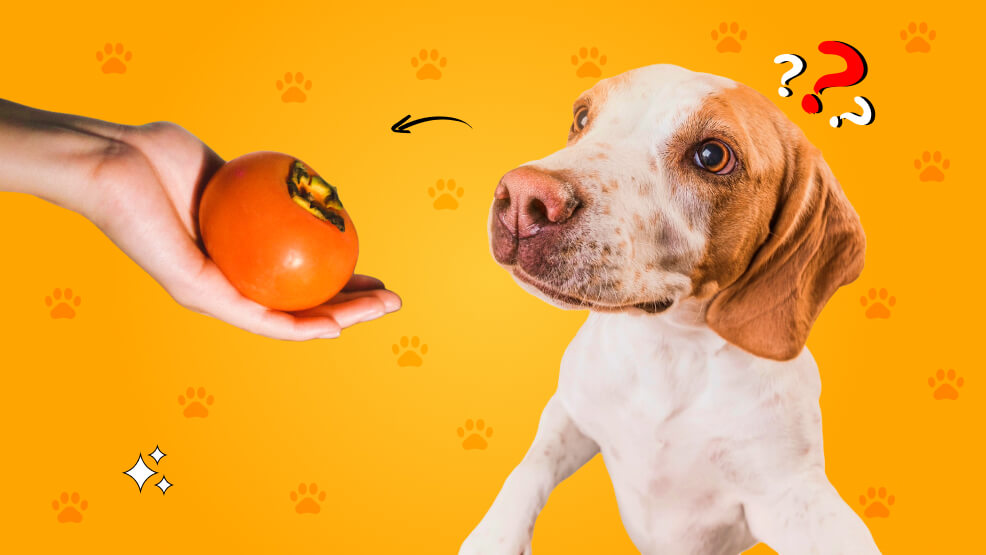
The short answer is yes, dogs can generally consume persimmons in moderation. However, as with any new food, it’s essential to introduce persimmons to your furry friend gradually and monitor their reaction closely. Dogs can have varying sensitivities and tolerances to different foods, so it’s wise to exercise caution when trying something new.
Nutritional Value of Persimmons for Dogs
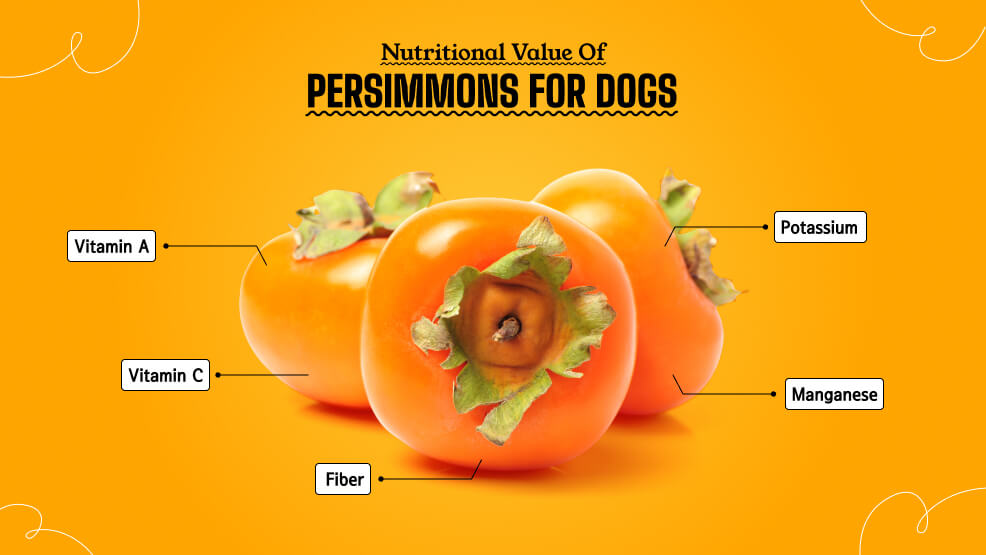
Persimmons are a treasure trove of nutrients that can benefit your canine companion’s well-being. These vibrant fruits are packed with:
- Vitamin A: Essential for maintaining healthy vision, skin, and immune function.
- Vitamin C: A powerful antioxidant that supports the immune system and aids in wound healing.
- Fiber: Promotes healthy digestion and helps maintain a balanced gut microbiome.
- Potassium: Plays a vital role in regulating muscle function and maintaining proper hydration.
- Manganese: Contributes to bone health and supports the metabolism of proteins and carbohydrates.
Incorporating persimmons into your dog’s diet can provide a nutritious boost, but it’s crucial to remember that moderation is key.
Potential Risks of Feeding Persimmons to Dogs
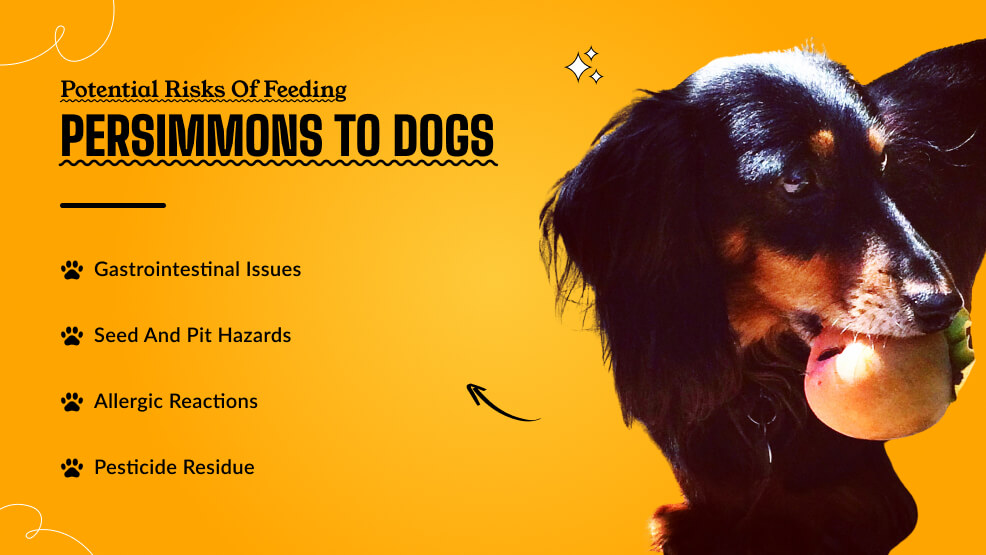
While persimmons can offer nutritional benefits, they also come with potential risks that should not be overlooked. Here are some factors to consider:
- Gastrointestinal Issues: While beneficial in moderation, the high fiber content in persimmons, can potentially cause digestive discomfort or diarrhea if consumed in excess.
- Seed and Pit Hazards: Persimmon seeds and pits can pose a choking hazard or cause intestinal blockages if ingested. It’s essential to remove these components before feeding persimmons to your dog.
- Allergic Reactions: Like humans, dogs can develop allergies or sensitivities to certain foods, including persimmons. Watch for signs of an allergic reaction, such as itching, hives, or difficulty breathing.
- Pesticide Residue: If the persimmons you’re feeding your dog are not organic, they may contain traces of pesticides or other chemicals that could harm your pet’s health.
What Happens if My Dog Eats Too Many Persimmons?
While the skin and flesh of the persimmon is generally considered safe for dogs to eat, they should not eat the seeds and pit of this fruit. The seeds and pits are not toxic for dogs, but they are small and can cause intestinal blockage.
If your dog exhibits any of the below-mentioned symptoms after eating a persimmon, you should seek immediate veterinary attention:
- Vomiting
- Diarrhea
- Loss of appetite
- Lethargy
- Abdominal pain or discomfort
Prompt medical attention can help prevent severe complications and ensure your dog’s well-being.
Safe Ways to Feed Persimmons to Dogs
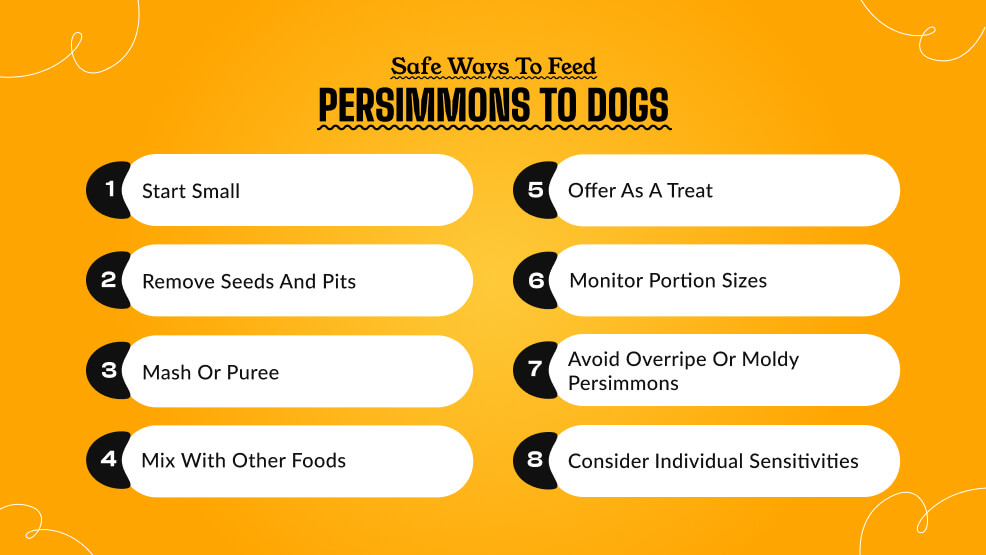
If you’ve decided to incorporate persimmons into your dog’s diet, it’s crucial to do so safely and responsibly. Here are some tips to follow:
- Start Small: Introduce persimmons in small quantities to gauge your dog’s reaction and tolerance. Begin with a few slices or chunks and gradually increase the portion size if no adverse effects are observed. Always gradually introduce new foods, including persimmons, into your dog’s diet to avoid digestive upset.
- Remove Seeds and Pits: Carefully remove the seeds and pits from the persimmons before feeding them to your dog. These components can pose a choking hazard or cause intestinal blockages.
- Mash or Puree: For smaller dogs or those with dental issues, consider mashing or pureeing the persimmon flesh to make it easier to consume and digest.
- Mix with Other Foods: Incorporate persimmons into your dog’s regular meals by mixing them with their regular kibble or wet food. This can help prevent overconsumption and ensure a balanced diet.
- Offer as a Treat: Persimmons can make a tasty and nutritious treat for your furry friend. However, remember to account for the calories and adjust their regular food intake to maintain a healthy weight.
- Monitor Portion Sizes: Persimmons should be fed in moderation, as overconsumption can lead to gastrointestinal issues or weight gain.
- Avoid Overripe or Moldy Persimmons: Overripe or moldy persimmons can harbor harmful bacteria or toxins that can make your dog sick.
- Consider Individual Sensitivities: Every dog is unique; some may have specific sensitivities or allergies to persimmons or other foods.
Alternatives to Persimmons for Dog Snacks
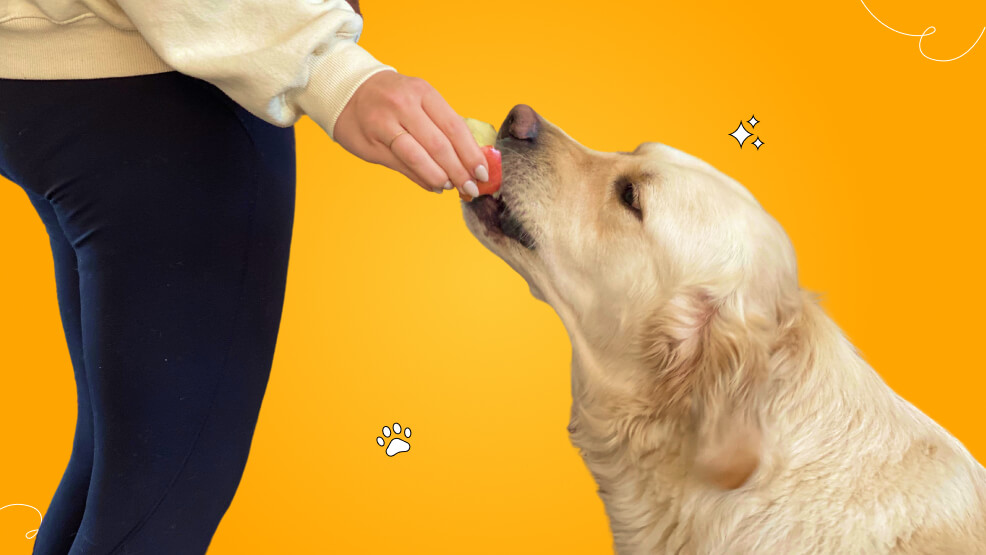
If you’re hesitant about feeding persimmons to your dog or want to explore other options simply, there are plenty of safe and nutritious alternatives to consider:
- Fresh fruits like apples, bananas, blueberries, and watermelon (in moderation)
- Vegetables such as carrots, green beans, and sweet potatoes
- Unsalted peanut butter or plain yogurt
- Commercial dog treats specifically formulated for your pet’s dietary needs
Remember, variety is key to your dog’s diet, and it’s always best to consult with your veterinarian before introducing any new foods or treats.
Yes, Dogs Can Eat Persimmons, but You Need to Exercise Caution
In conclusion, persimmons can be a safe and nutritious dog treat when introduced correctly and in moderation. These vibrant fruits offer a range of vitamins, minerals, and fiber that can benefit your canine companion’s overall health. However, it’s crucial to exercise caution, remove seeds and pits, and monitor your dog’s reaction closely when introducing persimmons to their diet.
If you still need to figure out feeding persimmons to your furry companion or have any concerns, feel free to reach out to your trusted veterinarian. They can provide personalized guidance and recommendations tailored to your dog’s specific needs and health conditions. Remember, your dog’s well-being should always be the top priority.








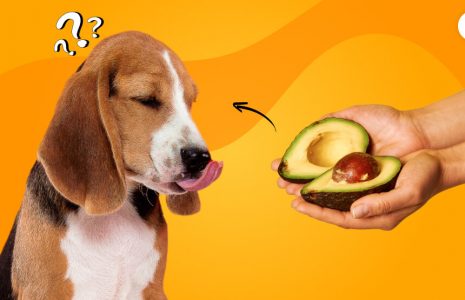
Leave A Comment